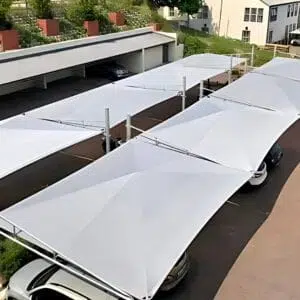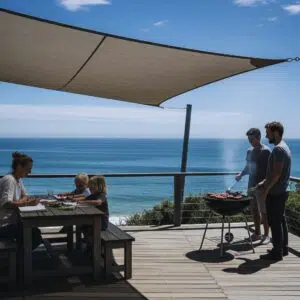Shadeports vs Shade Sails
Shadeports vs Shade Sails: Both Offer Essential Shade for the Garden Route Lifestyle
Shadeports vs Shade Sails: Both Offer Essential Shade for the Garden Route Lifestyle
South Africa’s abundant sunshine is central to our way of life, from weekend braais to relaxing on the stoep. But with one of the highest UV indexes in the world, creating effective shade is not just about comfort, it is a necessity. High-quality outdoor shade solutions SA are essential for protecting your family, guests, and valuable assets like cars and outdoor furniture from harsh sun damage.
The right covering transforms a sun-beaten patio or driveway into a usable space throughout the year, extending your home’s living area. When considering how to achieve this, two primary options come to mind: the robust, permanent shadeport and the versatile, stylish shade sail. Each serves a distinct purpose, and understanding their differences is the first step to making a smart investment for your property. For more ideas on enhancing your home, you can explore insights we have shared on our blog.
Core Differences in Structure and Function
Before weighing up weather performance or aesthetics, it helps to understand how these two solutions are fundamentally built. Their construction directly influences their primary function and where they fit best around your home.
Shadeports: Engineered for Maximum Protection
Think of a shadeport as an engineered, permanent structure. Typically built with galvanised steel or aluminium frames set in concrete footings, they are designed for maximum strength and longevity. This heavy-duty construction makes them one of the most reliable carport shade options available. Their main purpose is to provide uncompromising protection for high-value assets like cars, boats, or caravans from sun, hail, and rain. With our custom-made shadeports, you get a structure built to last.
Shade Sails: Designed for Flexible Style
Shade sails, on the other hand, are all about tension and fabric. They are made from a specialised high-density polyethylene (HDPE) material that is stretched between multiple anchor points on your home, poles, or other structures. This design gives them a much lighter, more architectural feel. Their flexibility allows for creative, stylish applications over patios, pools, and entertainment areas where the goal is to create a comfortable and protected leisure zone rather than a solid shelter. This approach is similar to how our retractable patio awnings offer adaptable shade for social spaces.
Performance in Local Weather Conditions
The debate over shadeports vs shade sails South Africa often comes down to how each handles our country’s unique and sometimes extreme weather. From the relentless Karoo sun to coastal gales, the right choice depends heavily on your local climate.
- Wind and Rain Resistance
A professionally installed shadeport offers superior stability. Its rigid frame is engineered to withstand the strong gusts of the Cape Doctor and the impact of heavy Highveld thunderstorms. Shade sails are durable, but they are not designed to handle the force of heavy hail. Proper tensioning is critical for managing wind, but a shadeport will always provide more robust, all-weather protection. - UV Radiation and Heat Management
Both options provide excellent UV blockage, with quality materials typically blocking 90% or more of harmful rays. However, the specialised HDPE fabric of a shade sail is designed to breathe. This allows hot air to escape, creating a noticeably cooler and more comfortable space underneath for people to gather. - Regional Climate Suitability
Local conditions matter immensely. In coastal areas like the Garden Route or Durban, the salty air makes rust a major concern. For shadeports, this means galvanised or powder-coated steel is non-negotiable to prevent corrosion. For shade sails, the challenge is intense sun exposure. Quality, colourfast fabric is essential to resist fading and material degradation, whether you live in Gauteng or the Northern Cape. Choosing the right materials is key, which is why our range of outdoor weather blinds is also built for these specific challenges.
Aesthetic Appeal and Design Flexibility
Beyond pure function, how your shade solution looks is a major consideration. Each option offers a distinct visual character that can either complement or clash with your home’s architectural style.
Shade sails are often celebrated for their modern, sculptural appearance. Using different colours, shapes like triangles and squares, and even layering multiple sails can create a striking architectural statement. They can turn a simple backyard into a visually dynamic space, making them the best shade for patio South Africa if you are aiming for a contemporary feel. The floating, lightweight look adds a touch of elegance over a pool or entertainment area.
It is easy to think of shadeports as purely functional, but that is an outdated view. A well-designed shadeport can be a sleek and integrated addition to your property. Customisation is key. By colour-matching the frame to your home’s trim, using cantilever designs to minimise the number of poles, and considering its placement, a shadeport can look intentional and polished. They suit a wide range of properties, from traditional family homes to modern commercial buildings, offering a more grounded and permanent aesthetic. You can see examples of how we integrate these solutions in our project portfolio.
Comparing Installation, Maintenance, and Cost
A practical breakdown of the installation process, ongoing upkeep, and financial investment is crucial for making a confident decision. While one may seem cheaper upfront, the long-term value proposition can be quite different.
| Feature | Shadeports | Shade Sails |
|---|---|---|
| Primary Use | Asset protection (cars, boats) | Leisure area shade (patios, pools) |
| Installation | Professional construction required | Professional recommended; some DIY possible |
| Upfront Cost | Higher initial investment | More budget-friendly |
| Durability | Extremely high; withstands harsh weather | Durable fabric; requires tensioning |
| Maintenance | Check for rust, structural integrity | Regular cleaning, occasional re-tensioning |
| Aesthetic | Functional, can be customised | Modern, sculptural, high design flexibility |
Note: This table provides a general overview. Costs and maintenance needs can vary based on material quality, size, and professional installation.
A shadeport is a significant construction project that requires professional teams, concrete foundations, and adherence to building standards. In contrast, while professional help is always recommended for safety when installing shade sails in SA, smaller applications can sometimes be a DIY task for a handy homeowner.
Long-term upkeep also differs:
- Shadeports: Require periodic checks for structural integrity and to touch up any spots where rust might appear.
- Shade Sails: Need regular cleaning to prevent mildew and may require occasional re-tensioning after strong winds.
Financially, shadeports have a higher upfront cost but offer exceptional durability. Steel structures often provide better long-term value yet Shade sails are generally more budget-friendly to purchase.
Making the Final Decision for Your Space
So, how do you make the final choice? It comes down to your primary goal for the space.
Choose a shadeport if your priority is maximum, all-weather protection for valuable assets like vehicles, where durability and strength are paramount. Opt for a shade sail if your main goals are aesthetic flexibility, creating a cool and inviting leisure area, and working within a specific budget.
However, the best way to ensure your investment is sound is with professional guidance.
A consultation helps assess your property’s unique needs, from sun paths and prevailing winds to soil conditions and architectural style. This expert input ensures you get a perfect, long-lasting solution tailored to your home.
To find the ideal shade solution for your space, we invite you to get in touch with our team for expert advice.




